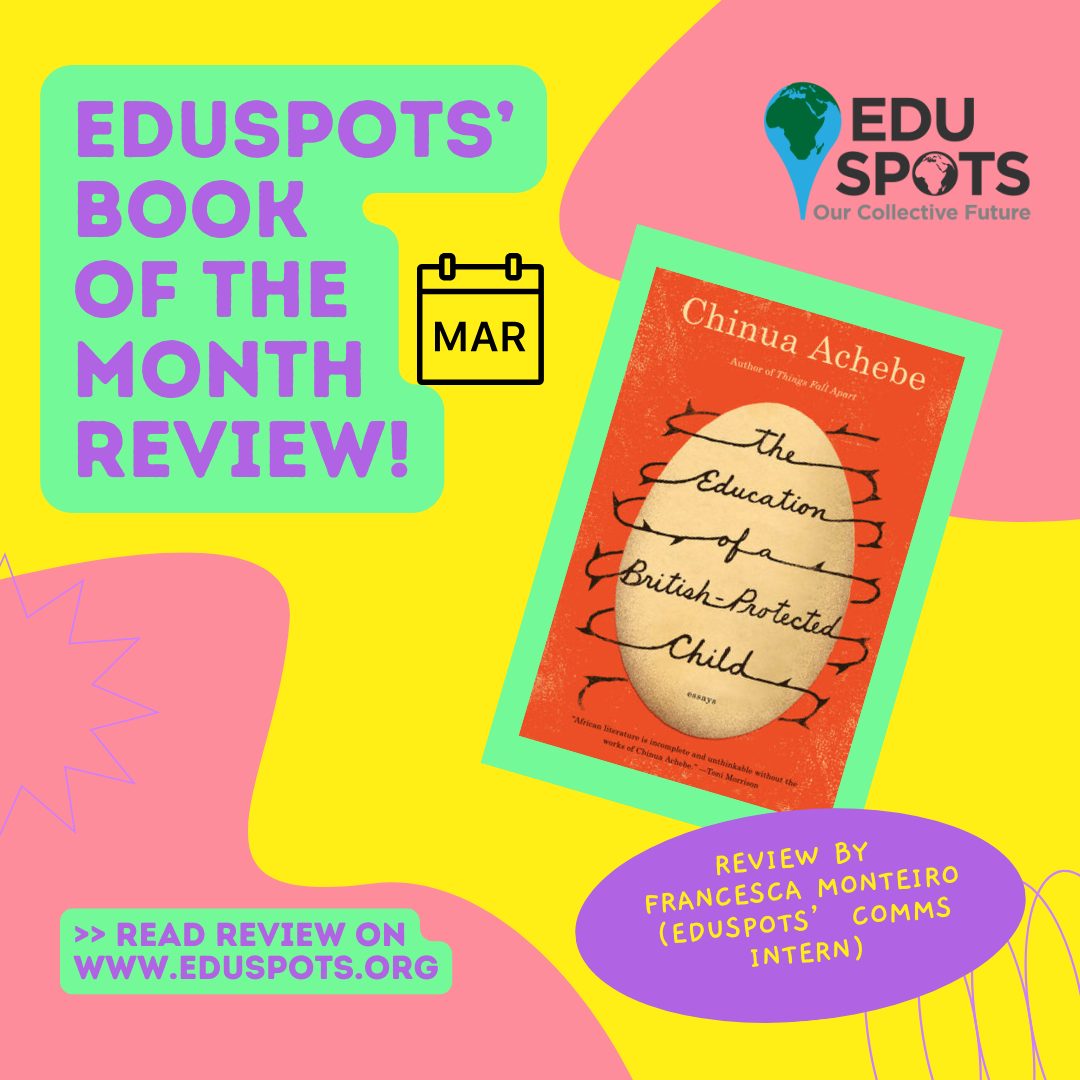Welcome back to our Book of the Month series, where we reflect on different literature to explore how it pertains to our core values as an organisation.
This month, we will break down how the esteemed Chinua Achebe’s collection of essays The Education of a British-Protected Child deconstructs the role of colonialism in African literature and education.
This collection of essays was published on the 50th anniversary of Achebe’s more notorious novel Things Fall Apart, which he acknowledges throughout the collection. These works hone in on various periods throughout his life, be it during his education, young adult life or experience of being a father. As he narrates a journey of picking apart his Nigerian identity, Achebe’s words can be molded into lessons for utilising the power of heritage when interpreting and creating literature.
In the first essay, Achebe unpacks what being a “British-Protected Child” truly means to him. To be assigned the label of “British-Protected” is to automatically be categorised as having British nationality, despite having none of the privileges that come with citizenship. He uses this label to describe how British culture was so blatantly enforced in his education, and how it affected his worldview. The books he was given to read were all English, and “were not about us or people like us”, but rather described “heroic white men (who) battled and worsted repulsive natives.” By villainising non-white people, these stories distorted Achebe’s self-perception, which he later had to challenge and question as he unpacked the truth behind this biased narrative that was imposed on him. After growing up in a colonialist school, he learned to be wary of what he had been taught, deconstructing the flaws and limitations of his education. The confession of his university professor epitomises the fault of a colonialist education: “we can only teach you what we know.” The perceived superiority possessed by colonialists led to a fundamental flaw in education that emerged due to ignorance. Achebe soon realises the shortcomings of a British education in Nigeria, which equips him to break down his own childhood and reevaluate how his identity was influenced by a colonialist upbringing.
“Because colonialism was essentially a denial of human worth and dignity, its education program would not be a model of perfection.”
In another one of his essays, African Literature as Restoration of Celebration, Achebe shares the Igbo concept “mbari,” which he defines as “celebration, through art, of the world and of the life lived in it.” After attending a writers symposium in Dublin, he shares his disappointment in other writers when they struggle to find the connection between literature and celebration. Achebe instead feels that the two are somewhat synonymous, as he uses writing as a means to depict life through celebration. He offers the idea of celebration as acceptance rather than praise or approval, enabling him to celebrate the reality of being influenced by his colonialist education. Accepting that this true and essential aspect of his identity exists, Achebe processes this with the idea of mbari to preserve his “pre-colonial inheritance of art,” while rejecting colonialism itself. This illustrates how literature can enable expression of real-life experiences and help to retrospectively grapple with complex issues of identity and belonging.
“I offer mbari as one illustration of my precolonial inheritance of art as celebration of my reality; of art in its social dimension; of the creative potential in all of us.”
Through his journey of fatherhood, Achebe further challenges the dangers of representation not being implemented in education in the essay My Daughters. Initially sceptical of his first daughter’s school of predominantly expatriate staff, he discovered that the books provided contained stories that exoticised and homogenised all of African culture. White people were being idolised by villagers in an unidentifiable town, and the story reads as narrow-minded and patronising. This draws attention to the widespread issue of the lack of truly representative staff and resources in education, and the damaging impact this can cause. Achebe used this as motivation to write his own story, Chike and the River, in effort to steer the narrative in children’s books away from these harmful stereotypes. By taking action of his own accord, he inspires other writers to use their talents to confront deep-rooted institutionalised racism, and warns parents like him against being drawn in by “glamorous covers” rather than legitimate, meaningful stories.
“Many parents like me, who never read children’s books in their own childhood, saw a chance to give to their children the blessings of modern civilization which they never had and grabbed it. But what I saw in many of the books was not civilization but condescension and even offensiveness.”
Achebe’s essays are both witty and wise, as he tells stories from his own life of dealing with discrimination and institutionalised racism to teach us how to confront these challenges ourselves. By drawing on his own experience, he brings attention to the legacy of imposed colonialist systems of education and how they perpetuate stereotypical racial hierarchy. His activism through writing is truly inspiring, encouraging young people, parents and writers to identify injustices in their own lives and to instigate change rather than stay silent. Achebe’s essays remind us of the importance of constantly revising and reflecting on our education systems to cultivate environments of inclusion, celebration and truth for young learners.


